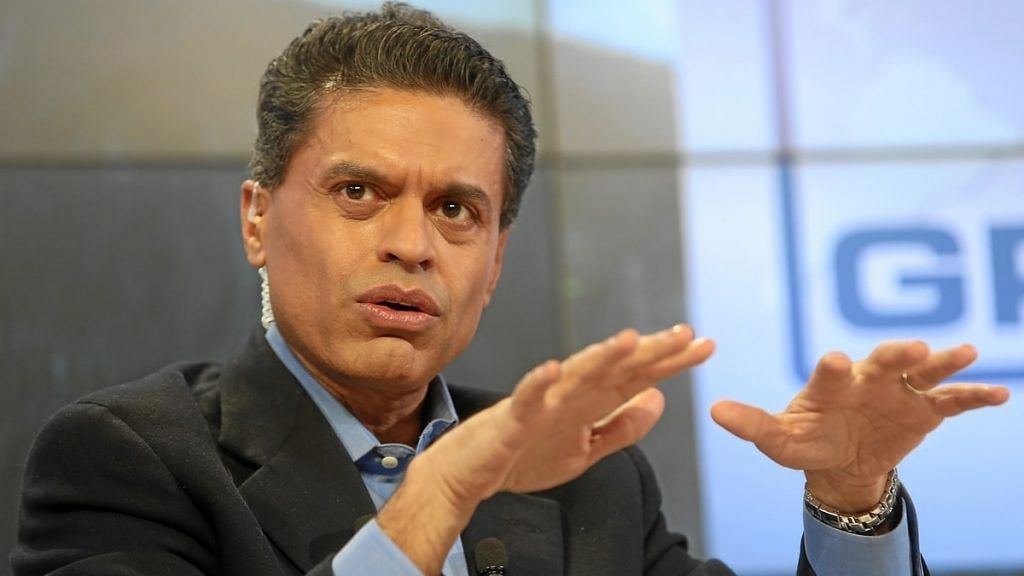New Delhi: The Indian democracy has begun to look more like Recep Tayyip Erdogan’s Turkey than liberal European democracies like France and Britain, scholar, CNN anchor, and Washington Post columnist Fareed Zakaria said.
In conversation with ThePrint’s Editor-in-Chief Shekhar Gupta during Off The Cuff Monday, Zakaria spoke about the rise of illiberal democracy in India and its possible ramifications for a diverse country.
“Sadly, India has moved closer to Erdogan’s Turkey instead of Britain or France,” he said.
Zakaria said Prime Minister Narendra Modi’s leadership has been deeply divisive, adding that he wondered if Modi really wanted to bring all of India together.
“What I wonder about Modi is, is he really about bringing all of India along with him?” Zakaria asked.
“Modi had the ability to do something different. He knows how to bring a certain part of India together. If he were to be all-inclusive, he would unify India in a way nobody else has been able to,” he added.
Highlighting that he was one of the first ones to interview Modi, he said, “There are elements of Narendra Modi that I have praised. He’s very intelligent and a very good politician. He has a good feel for communicating with the average Indian.”
He also expressed apprehensions on whether the Modi government will be held accountable for its poor handling of the Covid-19.
“Everyone’s approval ratings have been affected by their handling of the coronavirus. US did poorly, its approval ratings are down. Germany did well, Angela Merkel’s ratings have been rising. Greece handled the crisis superbly and its ratings have been going up. Boris Johnson did badly, his ratings have been falling,” he said.
Yet, even in the middle of a pandemic, the issues of “religion, caste, class continue to dominate the narrative” in India, said Zakaria. “It is to be seen whether the pandemic will strengthen or weaken Indian democracy.”
Zakaria also said that a core feature of liberal democracy — allowing opposing voices — has been deteriorating in India, adding that the erosion of free press has contributed to this decline.
“I don’t think India has a free press anymore,” he said. Media freedoms have been curtailed by the Modi government’s decision to pull out advertisements, and more worryingly “self-censorship”, he said.
Moreover, Indian institutions have not been a strong enough bulwark to resist against such illiberal tendencies, argued Zakaria. “They have been cowed down… and all this suggests more fragility (in India’s institutions) than I would have imagined.”
Also read: Indians will regret their silence over Modi’s ever-growing list of political prisoners
Nehru developed a ‘culture of democracy’
Asked how India has fared since he wrote his book, The Future of Freedom: Illiberal Democracy at Home and Abroad, in 2003, Zakaria said, “I have been very sad to see how Indian democracy has developed over the last few years, but there are some tendencies that are longer lived than that.”
He said, “In a system where you have some element of democracy, some broad element of public participation, there is a great danger that that legitimacy allows the elected government to engage in thoroughly illiberal things.”
These might include “violation of constitutional rights and liberal principles of open governments”, which lead to attacks on minorities and individuals. There is also erosion of rule of law and erosion of separation of powers.
A lot of liberal protections are “formal and legal”, but much of it is just norms and the “inner stuffing of democracy”.
Citing an instance of democratic culture and behaviour, Zakaria mentioned India’s first PM Jawaharlal Nehru, who had a majority in both the Houses and a government in two-thirds of Indian states.
“And yet, he would sit through the Question Hour, patiently listening to questions by opposition parties who would have four seats. Through this, he developed a culture of democracy,” said Zakaria.
Also read: This is no Emergency. Modi and Shah are using democracy to subvert democracy
